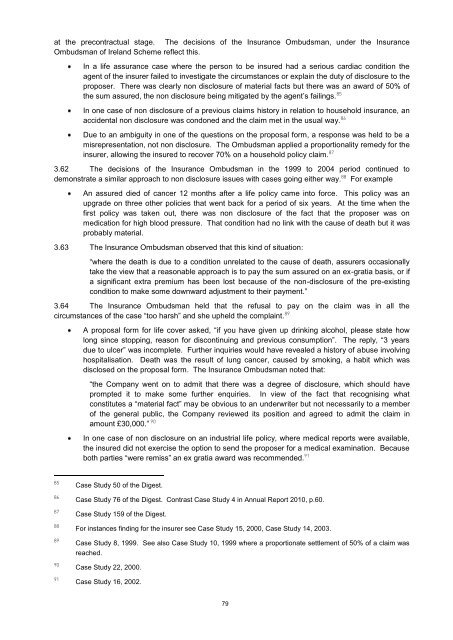Insurance Contracts CP - Law Reform Commission
Insurance Contracts CP - Law Reform Commission
Insurance Contracts CP - Law Reform Commission
You also want an ePaper? Increase the reach of your titles
YUMPU automatically turns print PDFs into web optimized ePapers that Google loves.
at the precontractual stage. The decisions of the <strong>Insurance</strong> Ombudsman, under the <strong>Insurance</strong><br />
Ombudsman of Ireland Scheme reflect this.<br />
In a life assurance case where the person to be insured had a serious cardiac condition the<br />
agent of the insurer failed to investigate the circumstances or explain the duty of disclosure to the<br />
proposer. There was clearly non disclosure of material facts but there was an award of 50% of<br />
the sum assured, the non disclosure being mitigated by the agent‘s failings. 85<br />
In one case of non disclosure of a previous claims history in relation to household insurance, an<br />
accidental non disclosure was condoned and the claim met in the usual way. 86<br />
Due to an ambiguity in one of the questions on the proposal form, a response was held to be a<br />
misrepresentation, not non disclosure. The Ombudsman applied a proportionality remedy for the<br />
insurer, allowing the insured to recover 70% on a household policy claim. 87<br />
3.62 The decisions of the <strong>Insurance</strong> Ombudsman in the 1999 to 2004 period continued to<br />
demonstrate a similar approach to non disclosure issues with cases going either way. 88 For example<br />
An assured died of cancer 12 months after a life policy came into force. This policy was an<br />
upgrade on three other policies that went back for a period of six years. At the time when the<br />
first policy was taken out, there was non disclosure of the fact that the proposer was on<br />
medication for high blood pressure. That condition had no link with the cause of death but it was<br />
probably material.<br />
3.63 The <strong>Insurance</strong> Ombudsman observed that this kind of situation:<br />
―where the death is due to a condition unrelated to the cause of death, assurers occasionally<br />
take the view that a reasonable approach is to pay the sum assured on an ex-gratia basis, or if<br />
a significant extra premium has been lost because of the non-disclosure of the pre-existing<br />
condition to make some downward adjustment to their payment.‖<br />
3.64 The <strong>Insurance</strong> Ombudsman held that the refusal to pay on the claim was in all the<br />
circumstances of the case ―too harsh‖ and she upheld the complaint. 89<br />
A proposal form for life cover asked, ―if you have given up drinking alcohol, please state how<br />
long since stopping, reason for discontinuing and previous consumption‖. The reply, ―3 years<br />
due to ulcer‖ was incomplete. Further inquiries would have revealed a history of abuse involving<br />
hospitalisation. Death was the result of lung cancer, caused by smoking, a habit which was<br />
disclosed on the proposal form. The <strong>Insurance</strong> Ombudsman noted that:<br />
―the Company went on to admit that there was a degree of disclosure, which should have<br />
prompted it to make some further enquiries. In view of the fact that recognising what<br />
constitutes a ―material fact‖ may be obvious to an underwriter but not necessarily to a member<br />
of the general public, the Company reviewed its position and agreed to admit the claim in<br />
amount £30,000.‖ 90<br />
In one case of non disclosure on an industrial life policy, where medical reports were available,<br />
the insured did not exercise the option to send the proposer for a medical examination. Because<br />
both parties ―were remiss‖ an ex gratia award was recommended. 91<br />
85<br />
86<br />
87<br />
88<br />
89<br />
90<br />
91<br />
Case Study 50 of the Digest.<br />
Case Study 76 of the Digest. Contrast Case Study 4 in Annual Report 2010, p.60.<br />
Case Study 159 of the Digest.<br />
For instances finding for the insurer see Case Study 15, 2000, Case Study 14, 2003.<br />
Case Study 8, 1999. See also Case Study 10, 1999 where a proportionate settlement of 50% of a claim was<br />
reached.<br />
Case Study 22, 2000.<br />
Case Study 16, 2002.<br />
79

















